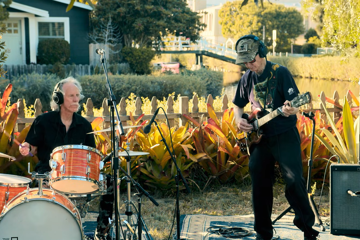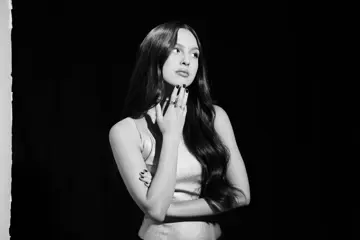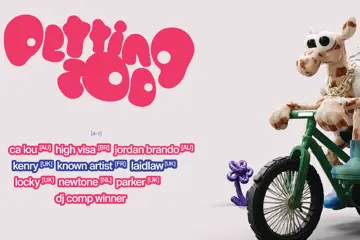So, after a 17-year break At The Drive In are releasing a new record to the world's collective yawn. Declan Melia asks, just who would want a legacy anyway?
During the chorus of the first track on At The Drive In's new record Cedric Bixler Zavala snaps: "They own your history and scrap it for parts." While a more paranoid singer may have veered away from the notion of "scrapping your history for parts" on their first new record in 17 years, what grabbed my attention was the line "they own your history" and it got me thinking: just who owns your favourite artist's history?
For those of you who have just joined us, At The Drive In's reformation is big news. Between them, Rage Against The Machine and Refused there were few more revered bands soundtracking the beginning of the millennium. I can remember my buddy Marcus wearing a t-shirt that bore the emblem of their defining record Relationship Of Command (stupid name, obviously) at Falls Festival 2004 and it was received less like a band t-shirt and more like a secret Masonic handshake. Walking from stage to stage he'd receive raised eyebrows, knowing nods and high fives. Digging that album was like a secret society.
When the band announced that they would be reforming for live shows in 2012 the collective response was one of almost teenage excitation — we'd finally be able to witness those explosive live shows that had hitherto been locked inside YouTube videos. Like so many things you've wanted for years though, it left us wanting. If there was an excitement in seeing At The Drive In live in 2012, it was the excitement of nostalgia. Even if the performances were as violent as they were more than a decade ago, the adrenaline we responded with was the adrenaline of memory. It was like trying to get high off of synthetic weed. So when we learnt that the band had recorded an album of new material for release in May this year, you'd have expected our reaction to be one of excitement and anticipation. And you'd be completely fucking wrong.
You're just not the same person you were when you fell in love with the band a decade ago.
Why is this? Why is it that the people least likely to want a 'legacy band' to make new music are their alleged biggest fans? Though it's unlikely this question will ever show up on Family Feud, we might assume the most popular answer would be something like, "Because new music will tarnish their legacy." This is a mode of thinking every music fan falls into — you should see my manager Glenn's face every time the Stones go near a recording studio — but it's also one of those statements that makes less sense the more you think about it. Also, is it actually true? Does Enter The Wu-Tang (36 Chambers) actually sound any different, any less good, after you've heard Iron Flag?
Don't miss a beat with our FREE daily newsletter
Before I continue this train of thought I'd just like to carry on with my At The Drive In anecdote a little further. Of course, we all expected it to be a rubbish record, after all, how could they top or even equal Relationship Of Command? Our minds were made up before we'd even finished reading the track listing. This is the problem with having a legacy — there's no room to move. Musical stagnancy will fail to live up to its predecessors, while any evolution will be met with a screw-faced 'just what the hell do they think they are doing?' The problem with in•ter a•li•a (stupid name, obviously) is that it doesn't play ball in this regard, it's actually a really good At The Drive In album. It sounds like the album they could have made instead of Relationship Of Command (Tilting At The Univendor (stupid name, obviously) in particular would've been right at home on 1998's In/Casino/Out). But, sadly, that's still not enough. Reviews were lukewarm to cold, and most of the old fans I know only gave it a few listens motivated by curiosity rather than musical hunger.
So we've come to a fairly depressing conclusion: if having a legacy means your live show remains frozen in amber while your so-called fans turn against your new work before they've heard it, then why would artists want one?
I suppose the answer is: they don't. If you look at some of the all time great artists; Bob Dylan, Joni Mitchell, Radiohead, their musical careers can be seen as a constant shedding of their legacies, they seem at pains to constantly evade their audiences expectations before the chrysalis of legacy hardens on them. So why didn't At The Drive In try this with their new record? The truth is because they're just not that sort of group. Like so many great records, Relationship Of Command was completely of its time. It was a confluence of musical influences, movements and ideas that came at just the right moment in one generation's lives in a way that's too perfect to reoccur. Even if they release the best album of their careers, it won't sound the same due to the march of time. You're just not the same person you were when you fell in love with the band a decade ago.
When you look at it like this, in•ter a•li•a is a three-way conversation between the artist, the listener and the person the listener was a decade ago. It's impossible to hear the new music without reflecting on who you were back then. How does this make you feel? Embarrassed? Regretful? Fond? Probably all three. So, just who 'owns' At The Drive In's, or any other great bands, musical legacy? They do. And they can do whatever they like with it; whether that means releasing a crappy record, a mediocre record, or a great record is up to them. How you hear it though, is up to you.















